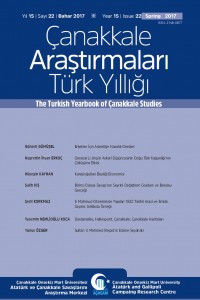Öz
The Eastern Türk Qaghanate seemed to enjoy the zenith of its power
during the 620s, until it suddenly weakened and fell within a very short time
between the years 627 and 630 because of ecologic, economic, military,
administrative and social problems. The death blow to this qaghanate
was struck by General Li Jing, who commanded a field army of the Tang
Dynasty of China and brought destruction upon it. Even though several
reasons caused the decline of this qaghanate, Li Jing’s military abilities
caused its final fall. A work titled Questions and Replies Between Tang
Taizong and Li Wei Gong, one of the Seven Military Classics of China,
is claimed to be a collection of dialogues between the Chinese emperor
Tang Taizong and his general Li Jing. While some scholars believe it to be
forged, others think that it is based on original drafts kept in the imperial
archives. This work is actually very significant as it contains the military
thought of Li Jing, but until now, it still has not been evaluated in the
studies focusing on Türk history. Thus, examining the general’s military
thought in this work also helps us to better understand how he managed to
defeat the Eastern Türk Qaghanate in the campaign of 630. In this study,
we have examined Li Jing’s military thought and we have compared his
statements in this work with his actions during the Türk campaign of 630
recorded in the Chinese sources. Our opinion is that because his statements
in this work coincide mostly with his actions during the campaign of 630,
the Questions and Replies is mostly based on original drafts that had only
a few later amendments to it.
Anahtar Kelimeler
Eastern Türk Qaghanate Li Jing Military Thought Tang Taizong Li Wei Gong Wen Dui Tang Dynasty
Kaynakça
- CHANG Jên-t’ang (1968). T’ang Devrindeki Doğu Göktürkleri Hakkında Yeni Belgeler: Ts’ê-fu Yüan-kuei ve Tzǔ-chih T’ung-chien’e Göre (618-745), Ankara.
- CHAVANNES, Edouard (1903). Documents Sur Les Tou-Kiue (Turcs) Occidentaux, Paris: Librairie d’Amérique et d’Orient Adrien Maisonneuve.
- CZEGLÉDY, K. (1962). “Čoγay-Quzï, Qara-Qum, Kök-Öng”, Acta Orientalia Academiae Scientiarum Hungaricae, 15 (1-3): 55-69.
- Das Strategikon des Maurikios (1981). (ed. George T. Dennis), (trans. Ernst Gamillscheg), Wien: Verlag der Österreichischen Akademie der Wissenschaften.
- DONG Gao 董誥 (1983). Quan Tangwen 全唐文, Beijing 北京: Zhonghua Shuju 中華書局.
- EBERHARD, Wolfram (1995). Çin Tarihi, Ankara: Türk Tarih Kurumu Yayınları.
- ERKOÇ, Hayrettin İhsan (2015). General Li Jing’in Askerî Düşüncesi ve Doğu Göktürk Kağanlığı’nın Çöküşü, (Unpublished PhD Dissertation), Ankara: Hacettepe Üniversitesi Sosyal Bilimler Enstitüsü.
- GÖMEÇ, Saadettin (2011). Kök Türk Tarihi, Ankara: Berikan Yayınevi.
- GRAFF, David A. (2002), “Strategy and Contingency in the Tang Defeat of the Eastern Turks, 629-630”, Warfare in Inner Asian History (500-1800), (ed. Nicola Di Cosmo), Leiden: Brill, 33-71.
- GROUSSET, René (1970). The Empire of the Steppes: A History of Central Asia, (trans. Naomi Walford), New Brunswick: Rutgers University Press.
- GUMİLЁV, L. N. (2002). Eski Türkler, (trans. Ahsen Batur), İstanbul: Selenge Yayınları.
- LIU Mau-tsai (1958). Die Chinesischen Nachrichten Zur Geschichte Der Ost-Türken (T’u-küe), 2 Volumes, Wiesbaden: Otto Harrasowitz.
- LIU Xun 劉珣 (1975). Jiu Tangshu 舊唐書, Beijing 北京: Zhonghua Shuju 中華書局.
- OUYANG Xiu 歐陽修 (1975). Xin Tangshu 新唐書, Beijing 北京: Zhonghua Shuju 中華書局.
- ÖLMEZ, Mehmet (1997). “Eski Türk Yazıtlarında Yabancı Öğeler (2)”, Türk Dilleri Araştırmaları, 7: 175- 186.
- SINOR, Denis (1994). “The establishment and dissolution of the Türk empire”, The Cambridge History of Early Inner Asia: From Earliest Times to the Rise of the Mongols, (ed. Denis Sinor), Cambridge: Cambridge University Press, 285-316.
- Sun Tzŭ on the Art of War: The Oldest Military Treatise in the World (1910). (trans. Lionel Giles), London: Luzac & Co..
- 《Tang Taizong Li Wei Gong Wen Dui 唐太宗李衛公問對》, 載《Jingyin Wenyuange Siku Quanshu 景 印文淵閣四庫全書》 (1986), 第726冊, Taibei 台北: Taiwan Shangwu Yin Shuguan 台灣商務印 書館.
- Tang Taizong Li Wei Gong Wen Dui 唐太宗李衛公問對 Questions and Replies Between Tang Taizong and Li Weigong (2004). (trans. He Xiaodong 何小東), Beijing: Junshi Kexue Chubanshe 軍事科學出版 社 Military Science Publishing House.
- TAŞAĞIL, Ahmet (1995). Gök-Türkler, Ankara: Türk Tarih Kurumu Yayınları.
- The Seven Military Classics of Ancient China (2007). (trans. Ralph D. Sawyer and Mei-chün Sawyer) , Boulder: Basic Books.
- WECHSLER, Howard J. (2007a). “The Founding of the T’ang Dynasty: Kao-tsu (reign 618-26)”, The Cambridge History of China – Volume 3 Part 1 – Sui and T’ang China, 589-906, (ed. Denis Twitchett), New York: Cambridge University Press, 150-187.
- ___________________ (2007b). “T’ai-tsung (reign 626-49) The Consolidator”, The Cambridge History of China – Volume 3 Part 1 – Sui and T’ang China, 589-906, (ed. Denis Twitchett), New York: Cambridge University Press, 188-241.
- WEN Daya 溫大雅 (1983). Da Tang Chuangye Qijuzhu 大唐創業起居注, Shanghai 上海: Shanghai Guji Chubanshe 上海古籍出版社.
- WRIGHT, Arthur F. (2007). “The Sui dynasty (518-617)”, The Cambridge History of China – Volume 3 Part 1 – Sui and T’ang China, 589-906, (ed. Denis Twitchett), New York: Cambridge University Press, 48-149.
Ayrıntılar
| Bölüm | Makaleler |
|---|---|
| Yazarlar | |
| Yayımlanma Tarihi | 15 Nisan 2017 |
| Yayımlandığı Sayı | Yıl 2017 Cilt: 15 Sayı: 22 |

